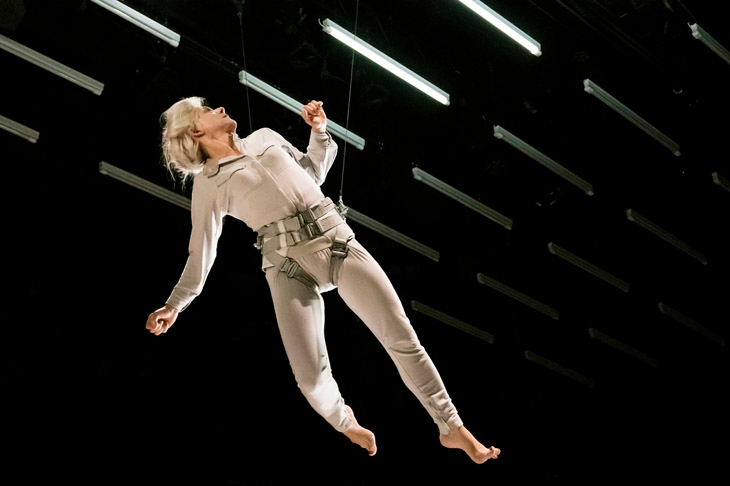In Beckett’s Happy Days a prattling Irish granny is buried waist-deep, and later neck-deep, in a refuse tip whose detritus inspires a rambling 90-minute monologue. ‘An avalanche of tosh’ was the Daily Mail’s succinct summary. Wings is similar but worse. Mrs Stilson (Juliet Stevenson), an American pensioner sheathed in white, hovers over the stage on ropes and talks non-stop gibberish. ‘Three times happened maybe globbidged, rubbidged uff to nothing there try again window up!’ Thus begins her battle with intelligibility. ‘And vinkled I,’ she goes on, ‘commenshed to uh-oh where’s it gone to somewhere flubbished what?’
The cause of her aphasia is unclear but vague images of scudding clouds and snorting biplanes suggest an air crash. She continues to speak nonsense while dangling in midair like a streak of saliva from the lips of a ruminating Friesian. ‘Hapst aporkchop fleetish yes,’ she tells us. Some doctors appear. ‘Are there seven days in a week?’ An interminable pause. ‘Seven, yes,’ she says. We’re making progress. ‘Can you cough, Mrs Tilson?’ ‘I’m not bort you know with plajits or we’d see it wencherday.’ We’re going back again. Finally, we get some information. Nurse: ‘You’ve had what’s called a stroke.’ Right-oh. And what were the biplanes about? No idea. Mrs Tilson, still trussed in her elasticated lederhosen, drops into a clinic where she’s due to be treated alongside two more aphasiacs. The scene that follows is not one Oscar Wilde would have written. In the last moments, her affliction fades and she speaks lucidly about flying, but it’s hard to pay attention because she has, by this stage, comprehensively trashed one’s patience.
Afterwards I read the play’s preface, which solved the mystery. The script arose from a chance encounter between the author and a wing-walker trying to recover from a stroke. They might have told us that earlier. Sitting around me at the Young Vic were 20 bored, fidgety schoolchildren who handled their frustration with commendable restraint. A few chatted softly, others dozed politely. I expect they were victims of a ‘gateway drug’ programme that lures youngsters into theatres with free seats in the hope of hooking them on drama permanently. This scam will succeed only if the gateway drug is of high quality. A clumsy, artless, philistine obstacle course like this can only destroy the clientele it seeks to engender. Very few of those hapless kids will tempt fate and return to a theatre for decades. Some will never go back. I wonder if Wings is sponsored by Netflix.
B at the Royal Court opens like a TV skit about terrorism. We’re in a safe house where two female activists are joined by a man. He teaches them how to build a nail bomb in a bucket. The mood is secretive and hush-hush. They wear masks and refer to bombs by code names, calling them ‘cows’ or ‘cheeses’ interchangeably. The set-up feels like a satire but the gags are not quite world-class: the man jokes that smearing faeces on the nails will convert the bomb into a biological weapon. The play becomes ever more baffling because it refuses to reveal its cultural and historical settings. Where are we? The characters have Spanish names but speak English with London accents. What year is it? The activists talk about bank raids, which suggests the Allende/Pinochet era when terrorists funded their campaigns with robberies. But no, it seems we’re in the present day. Sort of. The man laments the decline of political violence in the digital age.
‘We used to kill kings. We used to kill millionaires. Now all we do is make threats on the internet.’
As a summary of modern terrorism that seems, shall we say, a little incomplete. Because the characters are masked it’s impossible to read their faces and to discern what feelings they’re displaying or struggling to avoid displaying. Have they met before? Are there pre-existing relationships developing in the bomb factory? Apparently not. One of the she-terrorists claims to have planted 70 ‘cheeses’ in the past so she seems an odd candidate for a tutorial in bomb-making. She suddenly expresses the hope that their device will cause damage but no deaths. This demotes the play’s subject from terrorism (which is interesting, at least) to vandalism (which is rather less interesting). Then a nosy neighbour thumps on the door and demands admission. And the secretive terrorists, who speak in code and hide their identities, proceed to let this complete stranger into their safe house. At which point the play expires as a drama.
This is just a mirthless charade about three twerps indulging in make-believe radicalism. Any artistic director can, I suppose, choose a bad script by mistake. But there’s a difference here: the threat level. To stage a larky play about nail bombs in a theatre that adjoins a Tube station is the act of a cretin.







Comments